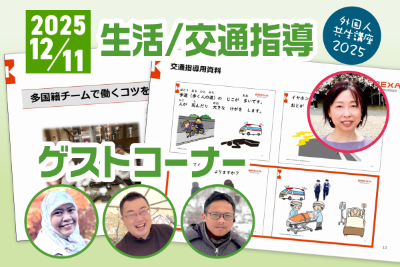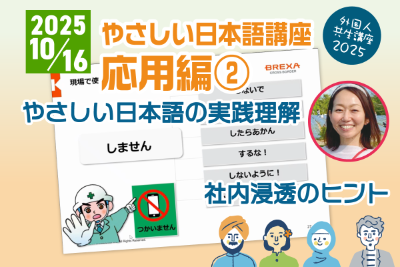- やさしい日本語
- ひらがなをつける
- Language
We provide multilingual content through machine translation. Translation accuracy is not 100%. About the multilingualization of the JAC website
- About JAC
- JAC Membership Information
- Specified Skilled Worker Acceptance
- Specified Skilled Worker Overview of the system
- 10 Mandatory Assistance for Foreigners
- Online individual consultation
- Seminar on Coexistence with Foreign Nationals
- Leading examples of host companies
- Case studies collection "Visionista"
- Foreigner's Voice
- Foreign Resident Acceptance Manual / Q&A
- Useful column "JAC Magazine"
- Acceptance support services
- Specified Skills Acceptance Support Service
- Skills improvement support
- Online Special Education
- Skill training
- Japanese Language Course
- Education and Training Support
- Subsidy system for obtaining qualifications
- Support for creating a comfortable workplace
- Temporary Return Support
- CCUS charge support
- Support system for promoting the accumulation of employment history
- Post-acceptance training
- Compensation system for Specified Skilled Worker (i)
- Daily life support
- Medical interpretation support
- Support for daily life problems
- freeJob matching
- The Specified Skills Evaluation Exam
- Home
- JAC Magazine
- Working with foreign workers
- What are some Japanese words that confuse foreigners and that foreigners can't understand?
- Home
- JAC Magazine
- Working with foreign workers
- What are some Japanese words that confuse foreigners and that foreigners can't understand?

What are some Japanese words that confuse foreigners and that foreigners can't understand?
I wrote the article!

(One company) Japan Association for Construction Human Resources
Chief of Research and Development Department / Administration Department / Public Relations Department
Motoko Kano
(Kano Motoko)

Hello, this is Kano from JAC (Japan Association for Construction Human Resources).
Japanese is a very difficult language for foreigners whose native language is not Japanese.
Some people who have frequent contact with foreigners may be concerned that, even though they try to speak clearly, they just can't seem to get their point across.
In fact, there are many cases where expressions that Japanese people use casually are difficult for foreigners to understand.
This time, we will introduce some Japanese words that confuse foreigners and Japanese words that foreigners cannot understand.
We will also introduce some tips on how to communicate clearly, so please refer to them.
What are some Japanese words that confuse foreigners and that foreigners can't understand?
There are some Japanese words that foreigners find confusing or cannot understand.
The most common ones are as follows:
- Long text
- Homophones
- Onomatopoeia
- Sentences without a subject or object
- Expressions where the answer is unclear
- Honorific and humble language
- informal speech
- Foreign words and Japanese English (katakana)
- Abbreviations
- dialect
- Double Negative
The following will explain in detail with examples.
[Example sentences] Japanese that confuses foreigners/Japanese that foreigners cannot understand

We will explain, with examples, Japanese words that confuse foreigners and Japanese words that foreigners cannot understand.
Long text
If a sentence is too long or contains too much information, it is difficult to understand.
Remove unnecessary information and keep sentences short.
【example】
現場で予定外の不具合が見つかったので修正が必要になり、その影響で14:00に予定されていた材料の搬入時間も変更しなければなりません。
→現場で配管に不具合が見つかりました。その配管の修理が必要です。材料の搬入は、配管の修理が終わってからやります。
Homophones
"機会(KIKAI) "and"機械(KIKAI)",性格(SEIKAKU) "and"正確(SEIKAKU) Words that are pronounced the same but have different meanings based on the kanji, such as "," are called homonyms.
This is a word that is difficult for foreigners to understand just by changing the placement of the accent.
When you can express something in different words, it makes it easier to understand if you rephrase it.
【example】
また次の機会に、一緒に食事をしましょう。
→次に会うときには、一緒に食事をしましょう。
Onomatopoeia
"ずきずき(ZUKIZUKI)" "がんがん(GANGAN)" "バタバタ(BATABATA)Words that express sounds or states, such as "," are called onomatopoeias.
For example, the sound of a dog barking is called "ワンワン(WANWAN)" but in English it is "バウワウ(BOWWOW)" is expressed as "
Each language has its own unique onomatopoeia, so it is easier to understand if you don't use onomatopoeia.
【example】
頭がずきずきする。
→頭が痛いです。
However, knowing onomatopoeias to express pain can be useful in case of an emergency.
Once you get used to Japanese, it would be a good idea to have them remember it.
You can find more information about expressing pain here.
Learn how to express pain in Japanese! How to convey pain effectively
Also, if a foreigner complains of pain, it will be easier to assess the situation if you ask them to express their pain level in numbers.
Try asking questions such as, "Please rate your pain on a scale of 0 to 10."
Sentences without a subject or object
Foreigners have difficulty understanding sentences that do not have a consistent subject, predicate, and object.
【example】
How about tonight? (gestures taking a drink)
Would you like to go for dinner with me tonight?
Expressions where the answer is unclear
Ambiguous expressions that do not clearly indicate a YES or NO will not get the message across.
【example】
結構です。
→いりません。
【example】
今度にしましょう。(In response to an invitation to go to lunch together today)
→今日は、私は行けません。
Honorific and humble language
"していらっしゃる" and other honorifics,申し上げます" and other humble expressions are difficult for foreigners.
【example】
お客様がいらっしゃいます。
→お客様が来ます。
informal speech
In fact, informal speech is also a form of Japanese that is difficult for foreigners to understand.
When foreigners learn Japanese, they are often conscious of the ending of a sentence being "です(desu)" "ます(masu)", so it would be good to use expressions that match this.
【example】
ハンマー持ってきて。
→ハンマーを持ってきてください。
Foreign words and Japanese English (katakana)
Foreign words written in katakana are the Japanese pronunciation of words that came from abroad.
For example, the "パン(PAN)" is a commonly used phrase, but since it is originally Portuguese, it may not be understood by English speakers.
For English-speaking people, "パン=調理器具のフライパン" This could be conveyed as "
Even words of English origin like "コーヒー(KŌHĪ)" is pronounced " in English.カフェ(KAFE)", so it may not be conveyed correctly in katakana.
Also, Japanese-English words, which are also written in katakana, are words that Japanese people have created in the style of English by interpreting the meanings and nuances of English words.
As a result, there are many things that cannot be understood by foreigners.
【example】
- Foreign words:パン、コーヒー、アルバイト、コップ etc.
- Japanese English:ホチキス(stapler)、ノートパソコン(laptop) etc.
Abbreviations
Abbreviations that omit Japanese words make it difficult to understand the original word, so it is best to use the full name.
【example】
有給
→有給休暇
Additionally, in Japan, there are many abbreviations of words that originate from English, and there are many cases where foreigners cannot understand them.
【example】
パソコン(personal computer)、リモコン(remote control)、ファミレス(family restaurant)
dialect
For foreigners who learn Japanese using standard Japanese, dialects are difficult because the words themselves change.
【example】
おらん。
→人がいません。
Double Negative
Double expressions, which are used when you want to convey a positive meaning by repeating negative words, or when you want to convey an ambiguous positive statement, can be difficult, so we will convert them into simpler words and sentences.
【example】
行かないわけではない。
→行きます。
Key points for making Japanese easy for foreigners to understand
There are some points to keep in mind when making Japanese easy for foreigners to understand.
If you keep the following points in mind, it will be easier for foreigners to understand.
- Use gestures
- The conclusion comes first
- Speak at a moderate speed while checking the other person's reaction
- Communicate in short sentences
- Don't use ambiguous expressions, state clearly
If you are communicating verbally, check how your message is getting across by observing the foreigner's reaction.
Using gestures will also help improve comprehension.
When communicating in written Japanese, be sure to keep the following points in mind:
- Don't use a lot of kanji
- Add furigana to kanji
- Actively include pictures, photographs, and diagrams
Kanji is difficult for foreigners, so let's add furigana.
In addition, incorporating visual information such as pictures and photographs will improve understanding.
It may seem difficult, but since it is communication between people, it is important to actively engage while having a conversation.
As a Japanese that is easy for foreigners to understand, there is a Japan called "Plain Japanese".
It is mainly used for disaster information and government office guidance, and is useful for disseminating information to foreigners who are not good at Japanese.
Plain Japanese is explained in detail here, so please refer to it.
やさしい日本語とは?例文や生まれた経緯などを紹介
Summary: There are many Japanese words that confuse foreigners and cannot be understood by foreigners
There are many expressions in Japanese that are usually used by Japanese people that are difficult for foreigners to understand.
In particular, Japan people often do not say clear conclusions or use vague expressions without giving straightforward answers, making it difficult for foreigners to understand.
Japanese that is easy to convey to foreigners is polite sentences that have a good grammar such as subject and predicate and end with "です(desu)" or "ます(masu)".
Also, be careful not to use foreign words written in katakana or Japanese English as much as possible, as they are unique to Japan.
Onomatopoeia such as "ずきずき(ZUKIZUKI)" is also a Japanese that is difficult to convey to foreigners.
However, it is a word that is easy to express your state and feelings, so it is a good idea to learn it gradually.
In order to make it easier for foreigners to convey, it is also important to incorporate gestures.
While communicating, let's find a way of speaking and expressing ourselves that suits the foreigner.
If you are a company that is considering accepting Specified Skilled Worker in the construction industry, please feel free to contact JAC!
We also introduce Specified Skilled Worker.
The author of this article

(One company) Japan Association for Construction Human Resources
Chief of Research and Development Department / Administration Department / Public Relations Department
Motoko Kano
(Kano Motoko)
Born in Aichi Prefecture.
He is in charge of public relations, research and investigation, and is the person behind social media.
We update our social media accounts daily with the desire to make people fall in love with Japan, to spread the appeal of construction from Japan to the world, and to ensure that Japan's construction industry continues to be the industry of choice around the world.
He is also engaged in research into the feasibility of implementing skills evaluation exam in Asian countries, and is conducting interviews with local organizations in each country.
Related articles

What is the Japanese level of Specified Skilled Worker? Precautions and measures after acceptance

Things to know when working with Muslim employees in a Japanese company

What is the obligation to notify the employment status of foreigners? Foreign workers who must be notified and how to apply

What is the status of residence that allows you to work? Explaining the types, how to obtain it, and more!

















